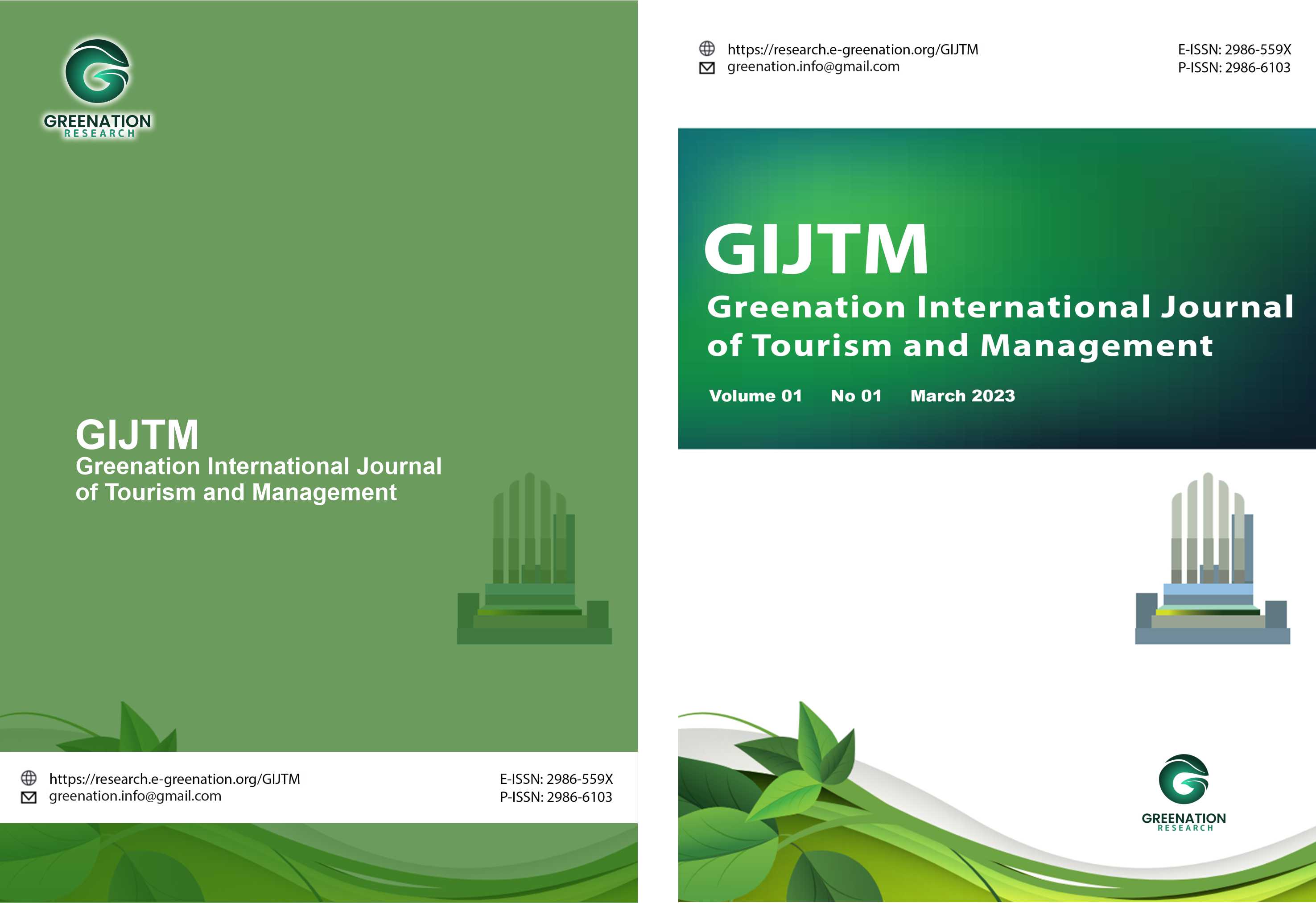Exploring Community Perceptions of Post-Mining Coastal Ecotourism: A Qualitative Study on Sustainable Tourism Development in Bangka Belitung
DOI:
https://doi.org/10.38035/gijtm.v3i1.386Keywords:
Coastal Ecotourism, Local Communities, Post-mining Tourism, Sustainability, Bangka Belitung, Qualitative ApproachAbstract
The Bangka Belitung region, historically recognized as the largest tin producer in Southeast Asia, now faces significant challenges in the utilization of post-mining land. One strategic approach that has emerged is the transformation of former mining areas into ecotourism destinations rooted in sustainability and community participation. This study aims to explore local community perceptions regarding the development of post-mining coastal ecotourism in Bangka Belitung. Employing a descriptive qualitative approach, data were collected through open-ended questionnaires completed by 180 local respondents. Thematic analysis was conducted using open coding, axial coding, and meaning triangulation. The study identified five key themes: (1) positive perceptions of the tourism potential of mining pits (kolong) and coastal areas; (2) concerns regarding environmental conditions and safety; (3) community expectations for involvement in tourism management; (4) local interpretations of sustainability; and (5) implementation barriers such as limited infrastructure and inadequate promotion. These findings underscore the importance of participatory and collaborative approaches in the development of post-mining tourism. Practical implications include community-based policy recommendations, environmental education strategies, and capacity-building efforts to support the creation of a fair and sustainable ecotourism model.
References
Adriana, D., Gunawan, H., & Kusnadi, M. (2022). Integrating community participation in sustainable marine ecotourism in Indonesia. Indonesian Journal of Tourism Studies, 6(2), 101–115.
Bonang, D., Hasanah, S. M., Nugroho, M. S., & Fitriyah, A. T. (2022). Geopark Rinjani, sport tourism, and the rise of local participation post COVID in Lombok, Indonesia. Journal of Environmental Management & Tourism, 13(4), 1207–1214.
Braun, V., & Clarke, V. (2006). Using thematic analysis in psychology. Qualitative Research in Psychology, 3(2), 77–101. https://doi.org/10.1191/1478088706qp063oa
Creswell, J. W., & Poth, C. N. (2018). Qualitative inquiry and research design: Choosing among five approaches (4th ed.). SAGE Publications.
Darmawan, A. (2021). Community-based tourism di kawasan pasca tambang: peluang dan tantangan. Jurnal Pariwisata Berkelanjutan Indonesia, 5(2), 55–67.
Fennell, D. A. (2020). Ecotourism (5th ed.). Routledge.
Hudayana, B., & Nugroho, I. (2023). Reclaiming mined landscapes through community ecotourism: A case study from Bangka Island. Indonesian Journal of Environmental Policy, 7(1), 31–44.
Kusuma, D. W., Ramadhani, F. Y., & Safitri, T. (2023). Persepsi masyarakat terhadap pengembangan wisata berbasis konservasi di kawasan pesisir. Jurnal Ilmu Lingkungan, 21(1), 55–66.
Lestari, A. D., Tanjung, A., & Mahendra, R. (2021). Konsep pembangunan berkelanjutan dalam pengembangan wisata bekas tambang. Jurnal Ekowisata Nusantara, 9(2), 78–89.
Miles, M. B., Huberman, A. M., & Saldaña, J. (2014). Qualitative data analysis: A methods sourcebook (3rd ed.). SAGE Publications.
Nowell, L. S., Norris, J. M., White, D. E., & Moules, N. J. (2017). Thematic analysis: Striving to meet the trustworthiness criteria. International Journal of Qualitative Methods, 16(1), 1–13.
Palinkas, L. A., Horwitz, S. M., Green, C. A., Wisdom, J. P., Duan, N., & Hoagwood, K. (2015). Purposeful sampling for qualitative data collection and analysis in mixed method implementation research. Administration and Policy in Mental Health and Mental Health Services Research, 42(5), 533–544.
Putra, I. N., Santosa, H., & Lestari, A. (2020). Community-based ecotourism in post-mining areas: Case from East Kalimantan. Journal of Rural Development, 9(3), 150–162.
Putri, N. D., Siregar, F. A., & Ramadhan, H. (2021). Studi kualitatif tentang adaptasi sosial komunitas tambang terhadap perubahan lahan. Jurnal Sosial Humaniora, 13(2), 123–139.
Rahmayani, N., & Febrianti, T. (2021). Konflik dan partisipasi dalam pengelolaan destinasi wisata pasca tambang. Jurnal Sosiologi Pembangunan, 12(1), 100–113.
Santosa, I., & Wahyuni, E. (2022). Dampak sosial dari reklamasi tambang timah di Bangka Tengah. Jurnal Ekologi Sosial, 4(3), 215–229.
Siregar, F. A., Putri, N. D., & Ramadhan, H. (2022). Resiliensi komunitas dalam menghadapi transformasi ruang pasca tambang. Jurnal Kajian Pembangunan Daerah, 10(2), 155–168.
Suwardhi, I. M., & Anindita, R. (2020). Potensi dan tantangan pengembangan ekowisata pesisir di Indonesia. Jurnal Pariwisata Tropika, 5(1), 20–29.
Sutrisno, A. D., Lee, C.-H., Suhardono, S., & Suryawan, I. W. K. (2024). Empowering communities for sustainable transition: Integrating tourism with economic and sociodemographic dynamics in post-mining strategies. Geo Journal of Tourism and Geosites, 55(3), 1112–1123.
Suryana, Y., & Wulandari, T. (2022). Persepsi masyarakat terhadap pengembangan wisata alam di kawasan konservasi. Jurnal Pariwisata dan Lingkungan, 7(2), 88–96.
Yuliana, L., Haris, A., & Anggraini, D. (2023). Persepsi masyarakat terhadap pembangunan kawasan ekowisata bekas tambang di Belitung. Jurnal Ilmu Sosial dan Humaniora, 8(1), 66–79.
Downloads
Published
How to Cite
Issue
Section
License
Copyright (c) 2025 Yulia Fitriani, Usep Suhud, Mohamad Rizan

This work is licensed under a Creative Commons Attribution 4.0 International License.
Copyright :
Authors who publish their manuscripts in this journal agree to the following conditions:
- Copyright in each article belongs to the author.
- The author acknowledges that the Greenation International Journal of Tourism and Management (GIJTM) has the right to be the first to publish under a Creative Commons Attribution 4.0 International license (Attribution 4.0 International CC BY 4.0).
- Authors can submit articles separately, arrange the non-exclusive distribution of manuscripts that have been published in this journal to other versions (for example, sent to the author's institutional repository, publication in a book, etc.), by acknowledging that the manuscript has been published for the first time at GIJTM.

























